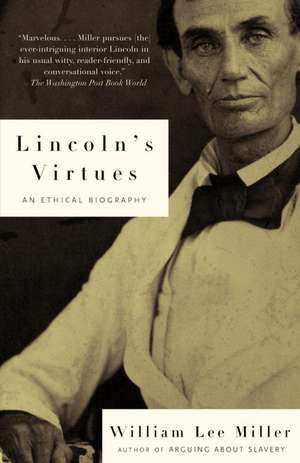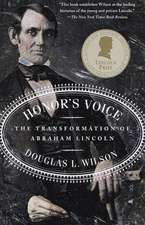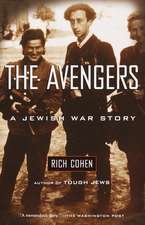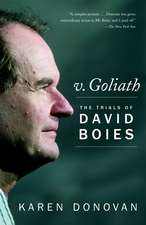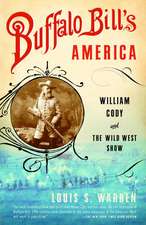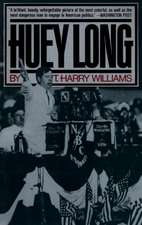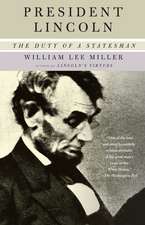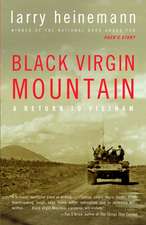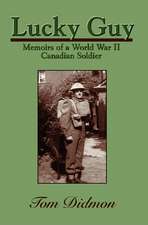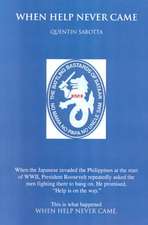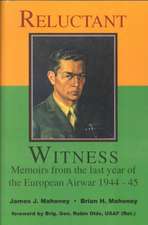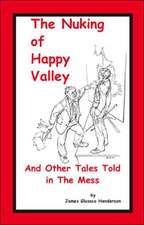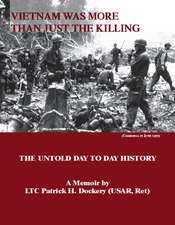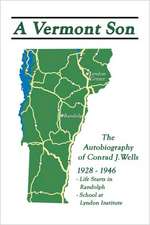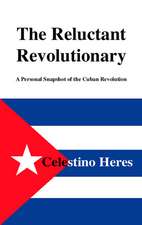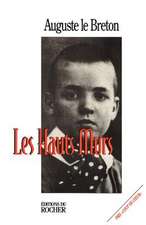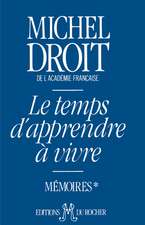Lincoln's Virtues: An Ethical Biography: Vintage Civil War Library
Autor William Lee Milleren Limba Engleză Paperback – 31 ian 2003
As Lincoln’s Virtues makes refreshingly clear, Lincoln was not born with his face on Mount Rushmore; he was an actual human being making choices — moral choices — in a real world. In an account animated by wit and humor, Miller follows this unschooled frontier politician’s rise, showing that the higher he went and the greater his power, the worthier his conduct would become. He would become that rare bird, a great man who was also a good man. Uniquely revealing of its subject’s heart and mind, it represents a major contribution to our understanding and of Lincoln, and to the perennial American discussion of the relationship between politics and morality.
Din seria Vintage Civil War Library
-
 Preț: 102.62 lei
Preț: 102.62 lei -
 Preț: 121.68 lei
Preț: 121.68 lei -
 Preț: 144.52 lei
Preț: 144.52 lei -
 Preț: 109.32 lei
Preț: 109.32 lei -
 Preț: 139.90 lei
Preț: 139.90 lei -
 Preț: 136.71 lei
Preț: 136.71 lei -
 Preț: 136.30 lei
Preț: 136.30 lei -
 Preț: 100.24 lei
Preț: 100.24 lei -
 Preț: 125.54 lei
Preț: 125.54 lei -
 Preț: 134.74 lei
Preț: 134.74 lei -
 Preț: 122.76 lei
Preț: 122.76 lei -
 Preț: 99.36 lei
Preț: 99.36 lei -
 Preț: 143.78 lei
Preț: 143.78 lei -
 Preț: 133.47 lei
Preț: 133.47 lei -
 Preț: 100.42 lei
Preț: 100.42 lei -
 Preț: 149.08 lei
Preț: 149.08 lei -
 Preț: 116.64 lei
Preț: 116.64 lei -
 Preț: 144.04 lei
Preț: 144.04 lei -
 Preț: 196.43 lei
Preț: 196.43 lei -
 Preț: 115.32 lei
Preț: 115.32 lei -
 Preț: 117.18 lei
Preț: 117.18 lei -
 Preț: 105.40 lei
Preț: 105.40 lei -
 Preț: 198.45 lei
Preț: 198.45 lei -
 Preț: 117.10 lei
Preț: 117.10 lei -
 Preț: 99.14 lei
Preț: 99.14 lei -
 Preț: 98.10 lei
Preț: 98.10 lei -
 Preț: 110.75 lei
Preț: 110.75 lei - 18%
 Preț: 71.23 lei
Preț: 71.23 lei - 16%
 Preț: 80.42 lei
Preț: 80.42 lei -
 Preț: 102.90 lei
Preț: 102.90 lei -
 Preț: 102.69 lei
Preț: 102.69 lei
Preț: 107.63 lei
Nou
Puncte Express: 161
Preț estimativ în valută:
20.59€ • 21.56$ • 17.04£
20.59€ • 21.56$ • 17.04£
Carte disponibilă
Livrare economică 15-29 martie
Preluare comenzi: 021 569.72.76
Specificații
ISBN-13: 9780375701733
ISBN-10: 0375701737
Pagini: 544
Ilustrații: 1 HALFTONE
Dimensiuni: 133 x 203 x 24 mm
Greutate: 0.39 kg
Editura: Vintage Books USA
Seria Vintage Civil War Library
ISBN-10: 0375701737
Pagini: 544
Ilustrații: 1 HALFTONE
Dimensiuni: 133 x 203 x 24 mm
Greutate: 0.39 kg
Editura: Vintage Books USA
Seria Vintage Civil War Library
Recenzii
“Marvelous . . . Miller pursues [the] ever-intriguing interior Lincoln in his usual witty, reader-friendly, and conversational voice.” –The Washington Post Book World
“Compelling and readable.” –The Wall Street Journal
“A fascinating account, sensitively written, rich in insight, of the moral self-education of our greatest president.” –Arthur Schlesinger, Jr.
“By tracing the development of Lincoln's moral reasoning and his steadfast commitment to doing what he saw as right, Miller refutes convincingly any notion that Lincoln was an accidental politician who stumbled into the presidency.”–St. Louis Post-Dispatch
“Outstanding interpretative biography. William Lee Miller explores Lincoln’s life and career from a unique perspective and helps us to better understand the man within the context of his times in his thoughtful, stimulating new book.”–BookPage
“Is it possible to say something new about Lincoln? The somewhat surprising answer, as William Lee Miller demonstrates in Lincoln’s Virtues, is yes.” –The New York Times Book Review
“A useful addition to the library of Lincoln books because it tackles a familiar subject from an unusual angle, giving appropriate centrality to Lincoln's moral convictions.” –Los Angeles Times Book Review
“Miller offers a distinctly new view of the Great Emancipator.” –The Christian Science Monitor
“Lincoln’s Virtues is an extraordinary book. . . . Miller proves that a lively presentation, animated by wit and humor, can co-exist with careful scholarship. The result is a new and surprisingly fresh look at the historical Lincoln.” –Douglas L. Wilson
“A captivating study . . . of Abe Lincoln's moral development.” –Esquire
“The depth of [Miller’s] study is obvious. He presents his ideas with a youthful enthusiasm, leavened with . . . wisdom.” –Providence Journal
“I have digested this book completely now, and I think it the best book ever on Abraham Lincoln.” –Fred J. Martin, Jr., member of the board, Abraham Lincoln Institute.
“A fresh perspective on the man about whom more has been written than any other American.” –North & South
“Masterful. . . . Bill Miller exhibits the same cluster of worthy qualities he assigns to his subject -- penetrating insight, wisdom about human nature, tenacious purpose, a wonderful sense of humor, and an eloquent style of expression.” –Doris Kearns Goodwin, author of No Ordinary Time: Franklin and Eleanor Roosevelt
“Miller's celebration of Lincoln's evolution as a moral man and a moral politician will persuade, reinforce, and inspire.... Very accessible and thought-provoking.” –Arizona Republic
“Lincoln's Virtues is unquestionably the most important study on Lincoln to appear in the last decade.” –Steven Rogstad, Review Editor, Lincoln Herald
“One of the most innovative studies of the sixteenth president yet to emerge.” –William C. Davis, History Book Club
“Compelling and readable.” –The Wall Street Journal
“A fascinating account, sensitively written, rich in insight, of the moral self-education of our greatest president.” –Arthur Schlesinger, Jr.
“By tracing the development of Lincoln's moral reasoning and his steadfast commitment to doing what he saw as right, Miller refutes convincingly any notion that Lincoln was an accidental politician who stumbled into the presidency.”–St. Louis Post-Dispatch
“Outstanding interpretative biography. William Lee Miller explores Lincoln’s life and career from a unique perspective and helps us to better understand the man within the context of his times in his thoughtful, stimulating new book.”–BookPage
“Is it possible to say something new about Lincoln? The somewhat surprising answer, as William Lee Miller demonstrates in Lincoln’s Virtues, is yes.” –The New York Times Book Review
“A useful addition to the library of Lincoln books because it tackles a familiar subject from an unusual angle, giving appropriate centrality to Lincoln's moral convictions.” –Los Angeles Times Book Review
“Miller offers a distinctly new view of the Great Emancipator.” –The Christian Science Monitor
“Lincoln’s Virtues is an extraordinary book. . . . Miller proves that a lively presentation, animated by wit and humor, can co-exist with careful scholarship. The result is a new and surprisingly fresh look at the historical Lincoln.” –Douglas L. Wilson
“A captivating study . . . of Abe Lincoln's moral development.” –Esquire
“The depth of [Miller’s] study is obvious. He presents his ideas with a youthful enthusiasm, leavened with . . . wisdom.” –Providence Journal
“I have digested this book completely now, and I think it the best book ever on Abraham Lincoln.” –Fred J. Martin, Jr., member of the board, Abraham Lincoln Institute.
“A fresh perspective on the man about whom more has been written than any other American.” –North & South
“Masterful. . . . Bill Miller exhibits the same cluster of worthy qualities he assigns to his subject -- penetrating insight, wisdom about human nature, tenacious purpose, a wonderful sense of humor, and an eloquent style of expression.” –Doris Kearns Goodwin, author of No Ordinary Time: Franklin and Eleanor Roosevelt
“Miller's celebration of Lincoln's evolution as a moral man and a moral politician will persuade, reinforce, and inspire.... Very accessible and thought-provoking.” –Arizona Republic
“Lincoln's Virtues is unquestionably the most important study on Lincoln to appear in the last decade.” –Steven Rogstad, Review Editor, Lincoln Herald
“One of the most innovative studies of the sixteenth president yet to emerge.” –William C. Davis, History Book Club
Notă biografică
William Lee Miller has taught at Yale University, Smith College, Indiana University, and the University of Virginia, where he is currently Miller Center of Public Affairs Scholar in Ethics and Institutions. He has been an editor and writer on a political magazine, a speechwriter, and a three-term alderman. He is the author of numerous books, most recently Arguing About Slavery, which won the D.B. Hardeman Prize for the best book on Congress.
Extras
Chapter One
Who Is This Fellow? He Is Smarter Than He Looks
1. A STARTLING DISPARITY
In the summer of 1830 the great preacher, evangelist, and politician Peter Cartwright, renowned throughout central Illinois, made a stop in a cornfield in Macon County while campaigning for the state legislature. Cartwright, "a tremendous cultural force in central Illinois" in those years, was "dressed as became his station" as a presiding elder in the Methodist Church. In the audience there was a "shambling and shabbily dressed" youth, only a few months beyond his twenty-first birthday and only a few months a resident of the state of Illinois and Macon County. This young man was working as a hired hand breaking prairie on a nearby farm, while still residing at his father's home, not yet having struck out on his own. To the amazement of the great preacher, the unlikely youngster presumed to engage him in argument, and made points that were remarkably intelligent. "The Great Methodist," it was later to be written, "was equally astonished at the close reasoning and the uncouth figure of Mr. Brown's extraordinary hired hand."
Throughout the life of that extraordinary hired hand whose name was Abraham Lincoln, there would be a recurrent pattern: an initial impression of the boy or the lad or the man, derived from externals and superficialities, would then be overthrown by the shock of recognition of his intellectual power.
Someone will have assumed, from some surface indication, that this fellow is a perhaps entertaining and distinctive but still, intellectually considered, an unremarkable specimen of the American common man in the settlements on the western frontier. And then they will be– astonished.
They will have made their initial assumption, first, from his physical appearance, for which those who have described him, sometimes including Lincoln himself, have used, among others, the words "ungainly," "stooped," "lanky," "long-armed," and "homely." David Turnham, his older friend, said of him in Indiana: "Abe was a long tall raw boned boy–odd and gawky." His good friend Joshua Speed remembered him having been in Springfield "a long, gawky, ugly, shapeless, man." Anna Gentry used this word "gawky" also: "Abe was a long–thin–leggy–gawky boy." The words "tall" and "long" appear often in the descriptions of him, and "raw" and "rawboned" and "bony": "His hands were large and bony," said Robert Wilson, who knew Lincoln in the state legislature. Wilson also said that his arms were longer than those of any man he had ever seen. "When standing straight, and letting his arms fall down his Sides, the points of his fingers would touch a point lower on his legs by nearly three inches than was usual with other persons." Also, said Wilson and others, his feet were unusually big. All these, note, were people who liked and admired Lincoln–everyone I have quoted so far. One can imagine what those who were hostile, in 1860-65, would say of his appearance.
And what of those who did not know him and were seeing him for the first time? His homeliness was of a particular western type that was not associated with high intelligence. Those just encountering Lincoln would have assumed his intellectual ordinariness also from his dress, which in his youth was the makeshift costume of a poor boy, but which even in his better-financed adulthood seems often to have been inadequate, featuring in particular the failure of his pants to reach his shoe tops. Nathaniel Grigsby drew a picture that many others confirmed about his dress in Indiana: "Between the shoe and Sock & his britches–made of buckskin there was bare & naked 6 or more inches of Abe Lincoln shin bone." In New Salem his sartorial inadequacies continued. Abner Y. Ellis, a merchant in the little village to which the young man moved after the encounter in the cornfield, said of him: "Frequently he had but one Suspender–no vest or Coat." Colman Smoot, a successful farmer who became justice of the peace in New Salem and who would loan Lincoln the money to buy a suit when he managed to be elected to the legislature, would paint a picture of Lincoln's dress much like that from many others: "His Pantaloons were very Short Causing him to look very awkward." And buying that suit, and later suits, and rising in position and solvency apparently did not altogether solve the problem. Jonathan Birch, a young Illinois lawyer who heard and saw Lincoln during the great debates of 1858, told Jesse Weik: "It is well-known that he was more or less careless of his personal attire, and that he usually wore in his great canvass with Douglas a linen cast, generally without any vest, a hat much the worse for wear, and carried with him a faded cotton umbrella which became almost as famous in the canvass as Lincoln himself."
Lincoln's appearance was not his only misleading attribute. Those who knew him as a boy might assume in him a lack of notable sharpness from his heredity, particularly his paternity: Could anything much be expected of the son of Thomas Lincoln? (This particular puzzle has generated a stream of genealogical speculation.)
Once he moved out into the slightly larger world of an Illinois village, where there would be a surprising sprinkling of college graduates, his intellectual limitations might have been inferred from his evident lack of formal education. Although in the one-room school in Indiana he was regarded as a "wizzard" at spelling, in more exacting settings the educated would notice that he often doubled consonants that were not supposed to be doubled, and throughout his life he made that error particularly calculated to set English teachers' teeth on edge, writing "it's" for the possessive of "it."
As he moved into the ever larger worlds of Springfield and statewide politics and law practice, many would underestimate him because he so plainly came out of the backwoods. And on his arrival on the national scene, all of those clues would be compounded by the Hoosier accent and the farmyard figures of speech and the vocabulary and imagery that are not the refined product of a cultured world.
At every stage along life's way, he might have been discounted by the company he kept and the friends and supporters he had won–by the Clary Grove Boys and their continuing equivalent. Can one be intellectually gifted whose companion is that whiskey-drinking, ballad-singing lowbrow Ward Lamon?
And not only throughout his life but on out into his posthumous fame and glory his penetrating mental activity would be obscured by his reputation as a teller of jokes, by the great thread of humor that ran through his life and his being. One can't tell jokes and stories like those, and collapse in convulsions of laughter, and have humor as an essential constant part of one's being, if one is an intellectually serious person. So when he comes before you, expect at best some entertaining, if a little coarse, jokes and stories.
But then he will speak–and some hearers will, to borrow a phrase that John Keats used in another connection, look at each other in wild surmise.
Abraham the boy in Kentucky for his first seven years, although we don't know much about him, does not appear to have been a precocious child or any kind of a natural genius. But the time would come when he would recognize that he was markedly superior in intellectual ability to those around him–to his father, on whom the events of life forced implicit comparisons; to his fellow students in the subscription schools, the "blab"schools that he attended for those five brief stints, and to the teachers of those schools, whom he was reported before long to have surpassed; and to the other adults in the little settlements in which he found himself. "He was always at the head of his class"; "He progress rapedly in all of his studies," Nathaniel Grigsby told Herndon about their school days in Indiana. Anna Gentry, who as Anna Roby had gone to school with Lincoln (she later married Allan Gentry, with whom Lincoln would make his first raft trip to New Orleans), would in later years warmly remember young Lincoln explaining to her the movements of the heavenly bodies. "He often . . . commented or talked to me about what he read–seemed to read it out of the book as he went along–did so with others–he was the learned boy among us unlearned folks–he took great pains to explain–could do it so simply."
Among the adults in Pigeon Creek, "Colonel" William Jones clearly was struck by the unexpected abilities of this interesting teenager who worked in his store–this "learned boy among us unlearned folks," to whom he loaned his copies of the Louisville Journal and the National Intelligencer, and whom he went to the trouble of persuading to support Clay, not Jackson.
Douglas Wilson has described Lincoln's impact when in 1831 he first appeared in New Salem, the little settlement on the Sangamon River. He was ungainly, he was penniless, he was uneducated, he was poorly and eccentrically dressed, and he was notably unhandsome. Those who met him at first assumed him to be another ordinary backwoods Hoosier lad.
But then they were startled to encounter an intelligence they had not suspected. Wilson quotes Caleb Carman, a shoemaker in New Salem, as one example: "When i first [met] him i thought him a Green horn. His appearance was very od, but after all this bad Appearance i Soon found [him] to be a very intelligent young man . . . after half hours Conversation with him I found him no Green Horn." Denton Offutt, the perhaps rather scatterbrained entrepreneur who hired Lincoln to take a second raft trip to New Orleans and then to work in his store and then to manage his mill, extravagantly admired Lincoln not only because of his stunning universal knowledge (as it seemed to Offutt) but also because of his inven- tiveness and his physical strength. In fact it was Offutt's bragging about the latter (Nicolay and Hay quote a wonderful observation about Offutt by one of his fellow citizens, that he "talked too much with his mouth") that led to Lincoln's famous wrestling match with Jack Armstrong of the Clary Grove Boys, which match, in turn, led to Lincoln's popularity with that group.
When he first got up to make political speeches, hearers expecting humorous stories would be startled, as Cartwright had been, by a cogent discourse. Judge Stephen T. Logan, who would be young Lincoln's second law partner, first heard him speak in 1832 when he was running for the legislature. "He was a very tall, gawky, and rough-looking fellow then," Logan was later to remember, "his pantaloons didn't meet his shoes by six inches. But after he began speaking I became very much interested in him. He made a very sensible speech."
Lincoln's first law partner, John T. Stuart, a key figure in launching both Lincoln's political and his legal career, must have had some similar experience when he encountered the popular young captain of A Company in the Thirty-first Regiment of the Illinois Militia in the Black Hawk War. Stuart, who had been to Centre College in Danville, Kentucky, and was already established as a lawyer in Springfield, was himself a major in that militia. He was impressed enough with this rough young fellow to make him both his political protégé and his law partner.
When, in November 1834, Lincoln made the trip to Vandalia to take his seat as a state legislator, he was twenty-five years old, just three and a half years away from having been, by his own famous description, a "strange, penniless, friendless, uneducated, boy working on a flatboat for ten dollars a month." He was appearing for the first time on the great stage of public affairs. Just four years later he would be his party's nominee for speaker of the house. Robert Wilson, his fellow Whig legislator and member of the Long Nine,* said of him:
* The Long Nine was a jocular name for the nine Sangamon County legislators, all of them tall, who sought to bring the capital to Springfield.
He was, on the stump, and in the Halls of Legislation a ready Debater, manifesting extraordinary ability in his peculiar manner of presenting his subject. He did not follow the beaten track of other Speakers, and Thinkers, but appeared to comprehend the whole situation of the Subject, and take hold of its first principles. . . . his memory was a great Store house in which was Stored away all the facts, acquired by reading but principally by observation; and intercourse with men Woman and children, in their Social, and business relations; learning and weighing the motives that prompt each act in life. Supplying him with an inexhaustible fund of facts, from which he would draw conclusions, and illustrating every Subject however complicated with anecdotes drawn from all classes of Society, accomplishing the double purpose, of not only proving his Subject by the anecdote, that no one ever forgets, after hearing Mr Lincoln tell a Story, either the argument of the Story, the Story itself, or the author.
When the prairie politician would make a brief appearance on the national political scene, as the lone Whig congressman from Illinois, representing the Seventh District in the Thirtieth Congress in 1847-49, the speech his fellow congressmen probably would have remembered was an entirely humorous partisan production mocking the pretensions to military glory of the 1848 Democratic candidate for president, Lewis Cass. The lanky and amusing westerner strode up and down the aisles of the House comparing to Cass's his own military glory, when he bravely attacked wild onions and engaged in bloody battles with mosquitoes. The young Whig congressman got laughs, but the speech probably did not increase his reputation for gravitas. (It is usually difficult to sustain a reputation both as a humorist and as a "serious" thinker; that has something to do, in general, with the comparative underemphasis on Lincoln as thinker.) But as we will see on a later page, an observer did note that this congressman spent his time in an unusual way. He did not do all the other things congressmen did, he spent his hours in the Library of Congress. For all his folksiness and joking, he was a bookworm.
From the Hardcover edition.
Who Is This Fellow? He Is Smarter Than He Looks
1. A STARTLING DISPARITY
In the summer of 1830 the great preacher, evangelist, and politician Peter Cartwright, renowned throughout central Illinois, made a stop in a cornfield in Macon County while campaigning for the state legislature. Cartwright, "a tremendous cultural force in central Illinois" in those years, was "dressed as became his station" as a presiding elder in the Methodist Church. In the audience there was a "shambling and shabbily dressed" youth, only a few months beyond his twenty-first birthday and only a few months a resident of the state of Illinois and Macon County. This young man was working as a hired hand breaking prairie on a nearby farm, while still residing at his father's home, not yet having struck out on his own. To the amazement of the great preacher, the unlikely youngster presumed to engage him in argument, and made points that were remarkably intelligent. "The Great Methodist," it was later to be written, "was equally astonished at the close reasoning and the uncouth figure of Mr. Brown's extraordinary hired hand."
Throughout the life of that extraordinary hired hand whose name was Abraham Lincoln, there would be a recurrent pattern: an initial impression of the boy or the lad or the man, derived from externals and superficialities, would then be overthrown by the shock of recognition of his intellectual power.
Someone will have assumed, from some surface indication, that this fellow is a perhaps entertaining and distinctive but still, intellectually considered, an unremarkable specimen of the American common man in the settlements on the western frontier. And then they will be– astonished.
They will have made their initial assumption, first, from his physical appearance, for which those who have described him, sometimes including Lincoln himself, have used, among others, the words "ungainly," "stooped," "lanky," "long-armed," and "homely." David Turnham, his older friend, said of him in Indiana: "Abe was a long tall raw boned boy–odd and gawky." His good friend Joshua Speed remembered him having been in Springfield "a long, gawky, ugly, shapeless, man." Anna Gentry used this word "gawky" also: "Abe was a long–thin–leggy–gawky boy." The words "tall" and "long" appear often in the descriptions of him, and "raw" and "rawboned" and "bony": "His hands were large and bony," said Robert Wilson, who knew Lincoln in the state legislature. Wilson also said that his arms were longer than those of any man he had ever seen. "When standing straight, and letting his arms fall down his Sides, the points of his fingers would touch a point lower on his legs by nearly three inches than was usual with other persons." Also, said Wilson and others, his feet were unusually big. All these, note, were people who liked and admired Lincoln–everyone I have quoted so far. One can imagine what those who were hostile, in 1860-65, would say of his appearance.
And what of those who did not know him and were seeing him for the first time? His homeliness was of a particular western type that was not associated with high intelligence. Those just encountering Lincoln would have assumed his intellectual ordinariness also from his dress, which in his youth was the makeshift costume of a poor boy, but which even in his better-financed adulthood seems often to have been inadequate, featuring in particular the failure of his pants to reach his shoe tops. Nathaniel Grigsby drew a picture that many others confirmed about his dress in Indiana: "Between the shoe and Sock & his britches–made of buckskin there was bare & naked 6 or more inches of Abe Lincoln shin bone." In New Salem his sartorial inadequacies continued. Abner Y. Ellis, a merchant in the little village to which the young man moved after the encounter in the cornfield, said of him: "Frequently he had but one Suspender–no vest or Coat." Colman Smoot, a successful farmer who became justice of the peace in New Salem and who would loan Lincoln the money to buy a suit when he managed to be elected to the legislature, would paint a picture of Lincoln's dress much like that from many others: "His Pantaloons were very Short Causing him to look very awkward." And buying that suit, and later suits, and rising in position and solvency apparently did not altogether solve the problem. Jonathan Birch, a young Illinois lawyer who heard and saw Lincoln during the great debates of 1858, told Jesse Weik: "It is well-known that he was more or less careless of his personal attire, and that he usually wore in his great canvass with Douglas a linen cast, generally without any vest, a hat much the worse for wear, and carried with him a faded cotton umbrella which became almost as famous in the canvass as Lincoln himself."
Lincoln's appearance was not his only misleading attribute. Those who knew him as a boy might assume in him a lack of notable sharpness from his heredity, particularly his paternity: Could anything much be expected of the son of Thomas Lincoln? (This particular puzzle has generated a stream of genealogical speculation.)
Once he moved out into the slightly larger world of an Illinois village, where there would be a surprising sprinkling of college graduates, his intellectual limitations might have been inferred from his evident lack of formal education. Although in the one-room school in Indiana he was regarded as a "wizzard" at spelling, in more exacting settings the educated would notice that he often doubled consonants that were not supposed to be doubled, and throughout his life he made that error particularly calculated to set English teachers' teeth on edge, writing "it's" for the possessive of "it."
As he moved into the ever larger worlds of Springfield and statewide politics and law practice, many would underestimate him because he so plainly came out of the backwoods. And on his arrival on the national scene, all of those clues would be compounded by the Hoosier accent and the farmyard figures of speech and the vocabulary and imagery that are not the refined product of a cultured world.
At every stage along life's way, he might have been discounted by the company he kept and the friends and supporters he had won–by the Clary Grove Boys and their continuing equivalent. Can one be intellectually gifted whose companion is that whiskey-drinking, ballad-singing lowbrow Ward Lamon?
And not only throughout his life but on out into his posthumous fame and glory his penetrating mental activity would be obscured by his reputation as a teller of jokes, by the great thread of humor that ran through his life and his being. One can't tell jokes and stories like those, and collapse in convulsions of laughter, and have humor as an essential constant part of one's being, if one is an intellectually serious person. So when he comes before you, expect at best some entertaining, if a little coarse, jokes and stories.
But then he will speak–and some hearers will, to borrow a phrase that John Keats used in another connection, look at each other in wild surmise.
Abraham the boy in Kentucky for his first seven years, although we don't know much about him, does not appear to have been a precocious child or any kind of a natural genius. But the time would come when he would recognize that he was markedly superior in intellectual ability to those around him–to his father, on whom the events of life forced implicit comparisons; to his fellow students in the subscription schools, the "blab"schools that he attended for those five brief stints, and to the teachers of those schools, whom he was reported before long to have surpassed; and to the other adults in the little settlements in which he found himself. "He was always at the head of his class"; "He progress rapedly in all of his studies," Nathaniel Grigsby told Herndon about their school days in Indiana. Anna Gentry, who as Anna Roby had gone to school with Lincoln (she later married Allan Gentry, with whom Lincoln would make his first raft trip to New Orleans), would in later years warmly remember young Lincoln explaining to her the movements of the heavenly bodies. "He often . . . commented or talked to me about what he read–seemed to read it out of the book as he went along–did so with others–he was the learned boy among us unlearned folks–he took great pains to explain–could do it so simply."
Among the adults in Pigeon Creek, "Colonel" William Jones clearly was struck by the unexpected abilities of this interesting teenager who worked in his store–this "learned boy among us unlearned folks," to whom he loaned his copies of the Louisville Journal and the National Intelligencer, and whom he went to the trouble of persuading to support Clay, not Jackson.
Douglas Wilson has described Lincoln's impact when in 1831 he first appeared in New Salem, the little settlement on the Sangamon River. He was ungainly, he was penniless, he was uneducated, he was poorly and eccentrically dressed, and he was notably unhandsome. Those who met him at first assumed him to be another ordinary backwoods Hoosier lad.
But then they were startled to encounter an intelligence they had not suspected. Wilson quotes Caleb Carman, a shoemaker in New Salem, as one example: "When i first [met] him i thought him a Green horn. His appearance was very od, but after all this bad Appearance i Soon found [him] to be a very intelligent young man . . . after half hours Conversation with him I found him no Green Horn." Denton Offutt, the perhaps rather scatterbrained entrepreneur who hired Lincoln to take a second raft trip to New Orleans and then to work in his store and then to manage his mill, extravagantly admired Lincoln not only because of his stunning universal knowledge (as it seemed to Offutt) but also because of his inven- tiveness and his physical strength. In fact it was Offutt's bragging about the latter (Nicolay and Hay quote a wonderful observation about Offutt by one of his fellow citizens, that he "talked too much with his mouth") that led to Lincoln's famous wrestling match with Jack Armstrong of the Clary Grove Boys, which match, in turn, led to Lincoln's popularity with that group.
When he first got up to make political speeches, hearers expecting humorous stories would be startled, as Cartwright had been, by a cogent discourse. Judge Stephen T. Logan, who would be young Lincoln's second law partner, first heard him speak in 1832 when he was running for the legislature. "He was a very tall, gawky, and rough-looking fellow then," Logan was later to remember, "his pantaloons didn't meet his shoes by six inches. But after he began speaking I became very much interested in him. He made a very sensible speech."
Lincoln's first law partner, John T. Stuart, a key figure in launching both Lincoln's political and his legal career, must have had some similar experience when he encountered the popular young captain of A Company in the Thirty-first Regiment of the Illinois Militia in the Black Hawk War. Stuart, who had been to Centre College in Danville, Kentucky, and was already established as a lawyer in Springfield, was himself a major in that militia. He was impressed enough with this rough young fellow to make him both his political protégé and his law partner.
When, in November 1834, Lincoln made the trip to Vandalia to take his seat as a state legislator, he was twenty-five years old, just three and a half years away from having been, by his own famous description, a "strange, penniless, friendless, uneducated, boy working on a flatboat for ten dollars a month." He was appearing for the first time on the great stage of public affairs. Just four years later he would be his party's nominee for speaker of the house. Robert Wilson, his fellow Whig legislator and member of the Long Nine,* said of him:
* The Long Nine was a jocular name for the nine Sangamon County legislators, all of them tall, who sought to bring the capital to Springfield.
He was, on the stump, and in the Halls of Legislation a ready Debater, manifesting extraordinary ability in his peculiar manner of presenting his subject. He did not follow the beaten track of other Speakers, and Thinkers, but appeared to comprehend the whole situation of the Subject, and take hold of its first principles. . . . his memory was a great Store house in which was Stored away all the facts, acquired by reading but principally by observation; and intercourse with men Woman and children, in their Social, and business relations; learning and weighing the motives that prompt each act in life. Supplying him with an inexhaustible fund of facts, from which he would draw conclusions, and illustrating every Subject however complicated with anecdotes drawn from all classes of Society, accomplishing the double purpose, of not only proving his Subject by the anecdote, that no one ever forgets, after hearing Mr Lincoln tell a Story, either the argument of the Story, the Story itself, or the author.
When the prairie politician would make a brief appearance on the national political scene, as the lone Whig congressman from Illinois, representing the Seventh District in the Thirtieth Congress in 1847-49, the speech his fellow congressmen probably would have remembered was an entirely humorous partisan production mocking the pretensions to military glory of the 1848 Democratic candidate for president, Lewis Cass. The lanky and amusing westerner strode up and down the aisles of the House comparing to Cass's his own military glory, when he bravely attacked wild onions and engaged in bloody battles with mosquitoes. The young Whig congressman got laughs, but the speech probably did not increase his reputation for gravitas. (It is usually difficult to sustain a reputation both as a humorist and as a "serious" thinker; that has something to do, in general, with the comparative underemphasis on Lincoln as thinker.) But as we will see on a later page, an observer did note that this congressman spent his time in an unusual way. He did not do all the other things congressmen did, he spent his hours in the Library of Congress. For all his folksiness and joking, he was a bookworm.
From the Hardcover edition.
Descriere
Miller's magisterial interpretative biography of the 16th United States president gives readers new insight into a man who managed to navigate the narrow course between ethics and political realism to become a great man who was also a good man.
